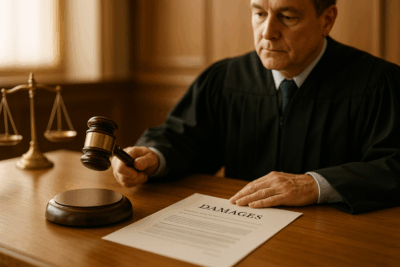After an accident, you may be entitled to compensation from the at-fault party for your injuries and other losses. This can come in the form of a settlement from their insurance provider or, if necessary, a lawsuit where the court decides what compensation you’re owed.
Every personal injury case is different. The compensation you receive depends on factors such as your recovery time, the medical expenses you’ve incurred, and how the injury has disrupted your daily life. To fully understand your rights and maximize your settlement, it’s important to know the types of damages you may be able to pursue.
 Compensatory Damages
Compensatory Damages
Compensatory damages are meant to repay you for the losses you’ve suffered due to an accident. If you’ve been injured in a car wreck, for example, you may be eligible to recover compensation for medical expenses, lost wages, and even property damage if your vehicle was involved.
Special Compensatory Damages
These damages cover financial losses related to the accident. Victims of car accidents, slip and fall incidents, or motorcycle crashes can claim compensation if they’ve lost income, incurred medical bills, or suffered property damage. To receive this type of compensation, you must provide clear evidence of your financial losses.
General Compensatory Damages
Also known as non-economic damages, general compensatory damages address the emotional and physical toll of an accident. These damages can include compensation for emotional distress, pain and suffering, and loss of enjoyment of life.
Since these losses are more subjective, they can be difficult to prove. An experienced attorney can help present your case effectively to pursue full compensation.
Wrongful Death Damages
When an accident results in a fatality, surviving family members may be eligible to pursue a wrongful death claim. Compensation may include the deceased’s final medical expenses, funeral costs, loss of financial support, and loss of companionship.
Wrongful death claims commonly arise from medical malpractice, negligence, or fatal accidents caused by another party’s actions.
In any claim for compensatory damages, you’ll need to demonstrate how the injury or loss has affected your life. A qualified attorney can help build a strong case on your behalf and ensure no detail is overlooked.
 Punitive Damages
Punitive Damages
Punitive damages are awarded not to compensate the victim, but to punish the at-fault party for particularly reckless or malicious behavior. They also serve to deter others from committing similar acts.
Examples might include a drunk driver causing a serious crash or a manufacturer knowingly selling a dangerously defective vehicle. In such cases, the court may award punitive damages in addition to compensatory damages.
In Oklahoma, punitive damages are capped. The amount generally cannot exceed the awarded compensatory damages. In most cases, punitive damages are limited to $100,000, or up to 4% of the defendant’s net worth if it is under $50 million.
These limits are designed to ensure fairness and discourage baseless or excessive claims. The court will also consider the defendant’s financial resources before finalizing the amount awarded.
If you’ve been injured due to someone else’s negligence, don’t leave your future to chance. The strength of your case starts with the strength of your legal team. Contact Aldridge Teasdale PLLC today to explore your options and protect your right to full and fair compensation.





